

Homework Policy
Policy generator.

We’re all aware of how students dread homework. They don’t like the idea of doing schoolwork at home after spending a whole day in school. We know how that feels. We’ve all been there during our elementary , high school , and college years. Although laziness is among the reasons, there are credible justifications for why students hate homework. That’s why some schools have imposed policies to regulate homework. Too much homework can be counterproductive. So as a school admin, if you see that your teachers are overworking students with homework, make your move to control it. You can start by downloading our Homework Policy Examples !
10+ Homework Policy Examples
1. homework policy template.
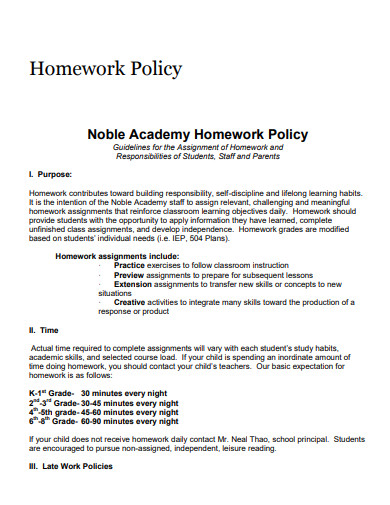
Size: 93 KB
2. Middle School Homework Policy
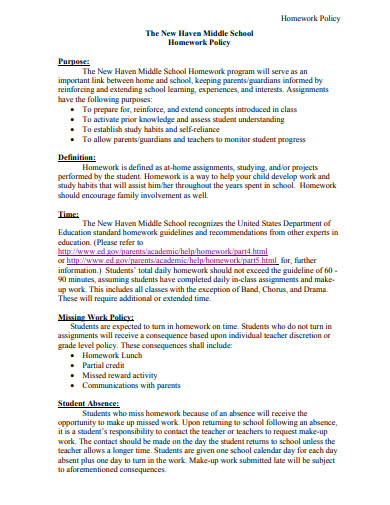
Size: 81 KB
3. Elementary School Homework Policy
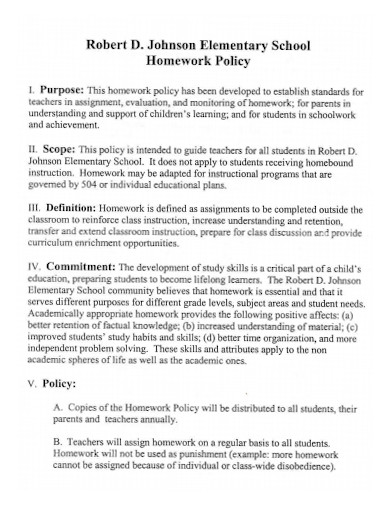
Size: 657 KB
4. Sample Homework Policy
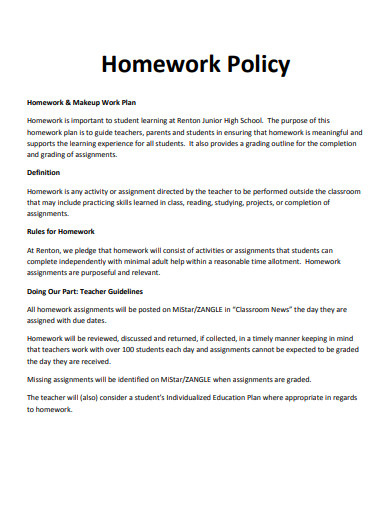
Size: 192 KB
5. High School Homework Policy
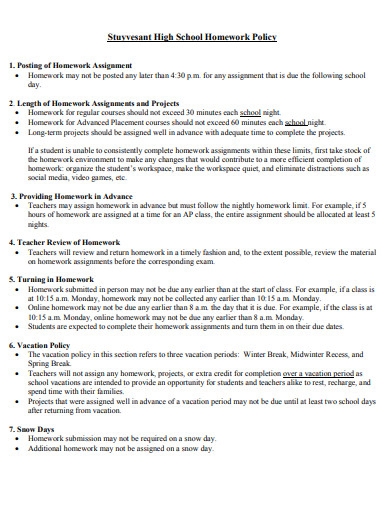
Size: 163 KB
6. Homework Policy Example
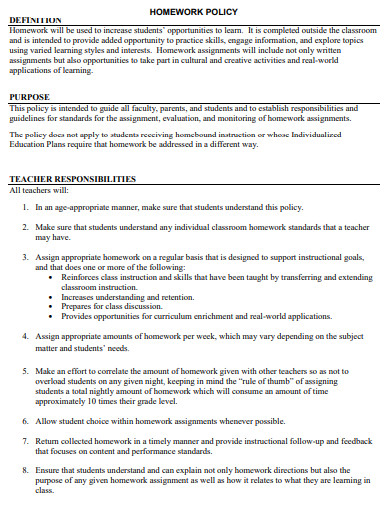
Size: 233 KB
7. Basic Homework Policy
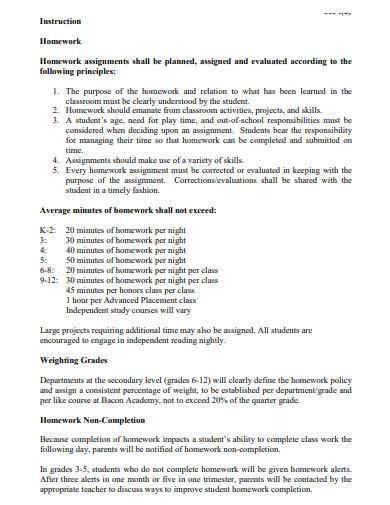
Size: 16 KB
8. School Homework Policy Template
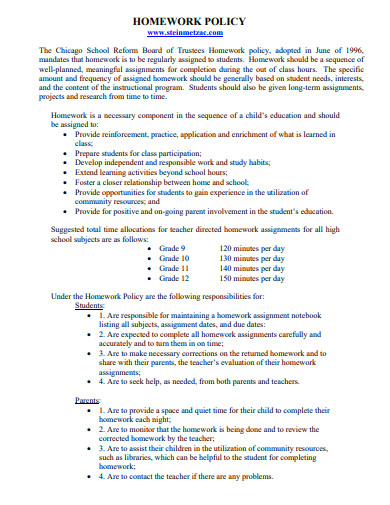
9. Homework Policy in PDF
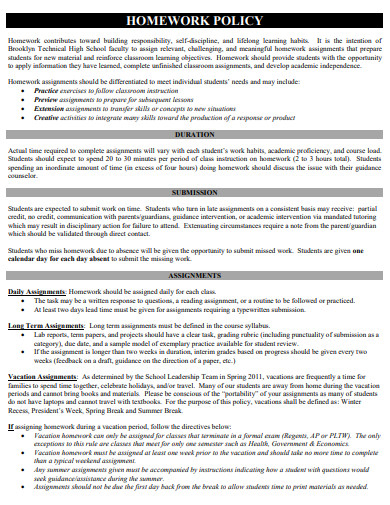
Size: 165 KB
10. High School Homework Policy Example
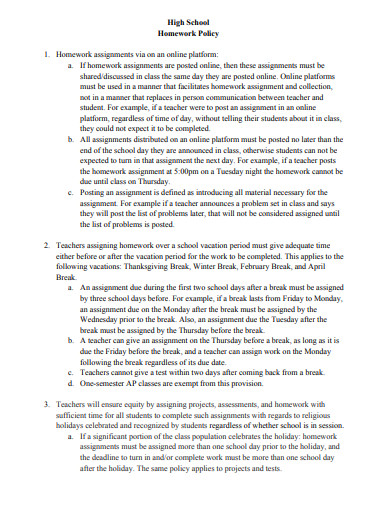
Size: 59 KB
11. Kindergarten Homework Policy
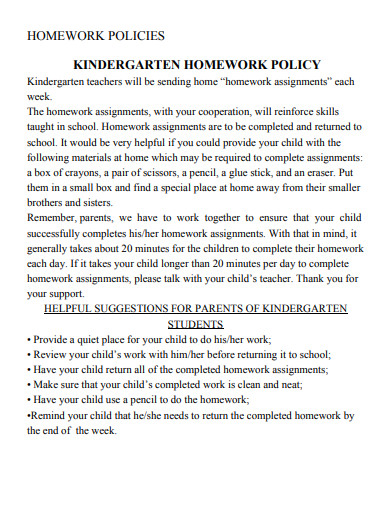
Size: 77 KB
What Is a Homework Policy?
A school homework policy is a set of guidelines on how often teachers should give homework or what type of homework they should give. Its main function is to protect students from being overworked and ensure that their homework is beneficial to their learning .
Homework policies are an important aspect of classroom management . It’s crucial not to drown students with school work. They need time to breathe from doing study activities . Other than that, some teachers might be giving homework that contributes nothing to their studies. Homeworks that are irrelevant only serves to waste the students’ time and energy. But with a homework policy elementary school, high school, or college, that won’t happen.
The Purpose of Homework in Schools
At the start of this blog, we’ve been shedding a bad light on homework inadvertently. Giving a home assignment to a student has some benefits. After all, homework wouldn’t exist in the first place if it doesn’t have a real purpose.
One purpose of homework is to push students to immerse themselves more with their studies. That helps them to absorb what they’ve learned during classes more effectively. It keeps their learning process consistent outside of the classroom . And also, homework teaches students to be responsible and professional, especially when it comes to meeting deadlines.
Another function of homework is that it can be a way for parents to be more involved in their children’s education. They can monitor what lessons their kids are studying by seeing what sort of schoolwork they’re doing at home.
How to Create a Homework Policy
Among the first steps you must take to protect students from too much and irrelevant homework is creating a homework policy. To get you started, we’ll show you our short 4-step guide below.
Step 1: Conduct a Survey
In general, conducting a survey is the first step in formulating policies. In this case, you need to survey the students regarding their homework duties. Your survey form must ask the right questions, such as how homework affects them mentally and how useful it is in the lesson plan . Find out how functional the students’ homework is to see its pros and cons.
Step 2: Communicate with Faculty
Imposing a homework policy is a drastic change in your school’s teaching process. That said, you should communicate about it with your faculty staff . Based on the findings of your survey, let your teachers know what specific regulations you’ll impose in terms of giving homework. You may also ask if they have suggestions or objections about your proposed policy . If there are, you can make some adjustments if you see them fit.
Step 3: Write Down the Regulations
After you make adjustments and finalize everything, write the homework regulations in a document or memo . Make sure to explain each of them in detail. Justify how each regulation is helpful for the students’ learning and well being. For instance, if one regulation is a No Homework on Fridays, you can justify it by saying students need the weekends to spend more time with friends and family. And that it gives them a chance to refresh their minds from school pressure.
Step 4: Add the Homework Policy to the Student and Teacher Handbook
To make the homework policy an official school policy, integrate it into the teacher and student handbook. In doing so, both faculty and students will be more aware of it. That way, the homework policy will slowly but surely become a norm in your school. The teachers, especially, will follow it strictly.
What is the 10-minute rule in homework?
The 10-minute homework rule, as its name implies, suggests that teachers should only give homework that students can finish in under 10 minutes. However, this rule mostly only applies to first graders.

What type of homework is considered meaningful?
The type of homework that’s meaningful are those that are in-line with the curriculum and beneficial to the learning process. Meaningful homework complements the lesson plan significantly. And they’re doable depending on the students’ current level of capability. A homework that adds nothing to the students’ progress is merely a to-do task .
Is it too much to give two hours of homework?
According to the Stanford Graduate School of Education , beyond two hours of homework is too much. Having more than two hours of homework to do has three negative effects on students. These are:
- Increase in stress levels, affecting productivity
- Health risks, such as sleep deprivation, severe weight loss, and exhaustion
- Less time with friends and family, which can lead to depression and neglect of schoolwork
Homework is an integral part of your school’s teaching methods. It is an extension of your school’s guidance for the students outside the classroom. But there have to be limitations. So start making a homework policy now. And don’t forget to download our Homework Policy Template.
Text prompt
- Instructive
- Professional
Draft a school policy on the use of technology in classrooms, outlining acceptable devices and usage guidelines
Create a student conduct policy for a high school, including expectations for behavior, dress code, and disciplinary actions
- Resources ›
- For Educators ›
- Tips & Strategies ›
Creating a Homework Policy With Meaning and Purpose
- Tips & Strategies
- An Introduction to Teaching
- Policies & Discipline
- Community Involvement
- School Administration
- Technology in the Classroom
- Teaching Adult Learners
- Issues In Education
- Teaching Resources
- Becoming A Teacher
- Assessments & Tests
- Elementary Education
- Secondary Education
- Special Education
- Homeschooling
- M.Ed., Educational Administration, Northeastern State University
- B.Ed., Elementary Education, Oklahoma State University
We have all had time-consuming, monotonous, meaningless homework assigned to us at some point in our life. These assignments often lead to frustration and boredom and students learn virtually nothing from them. Teachers and schools must reevaluate how and why they assign homework to their students. Any assigned homework should have a purpose.
Assigning homework with a purpose means that through completing the assignment, the student will be able to obtain new knowledge, a new skill, or have a new experience that they may not otherwise have. Homework should not consist of a rudimentary task that is being assigned simply for the sake of assigning something. Homework should be meaningful. It should be viewed as an opportunity to allow students to make real-life connections to the content that they are learning in the classroom. It should be given only as an opportunity to help increase their content knowledge in an area.
Differentiate Learning for All Students
Furthermore, teachers can utilize homework as an opportunity to differentiate learning for all students. Homework should rarely be given with a blanket "one size fits all" approach. Homework provides teachers with a significant opportunity to meet each student where they are and truly extend learning. A teacher can give their higher-level students more challenging assignments while also filling gaps for those students who may have fallen behind. Teachers who use homework as an opportunity to differentiate we not only see increased growth in their students, but they will also find they have more time in class to dedicate to whole group instruction .
See Student Participation Increase
Creating authentic and differentiated homework assignments can take more time for teachers to put together. As often is the case, extra effort is rewarded. Teachers who assign meaningful, differentiated, connected homework assignments not only see student participation increase, they also see an increase in student engagement. These rewards are worth the extra investment in time needed to construct these types of assignments.
Schools must recognize the value in this approach. They should provide their teachers with professional development that gives them the tools to be successful in transitioning to assign homework that is differentiated with meaning and purpose. A school's homework policy should reflect this philosophy; ultimately guiding teachers to give their students reasonable, meaningful, purposeful homework assignments.
Sample School Homework Policy
Homework is defined as the time students spend outside the classroom in assigned learning activities. Anywhere Schools believes the purpose of homework should be to practice, reinforce, or apply acquired skills and knowledge. We also believe as research supports that moderate assignments completed and done well are more effective than lengthy or difficult ones done poorly.
Homework serves to develop regular study skills and the ability to complete assignments independently. Anywhere Schools further believes completing homework is the responsibility of the student, and as students mature they are more able to work independently. Therefore, parents play a supportive role in monitoring completion of assignments, encouraging students’ efforts and providing a conducive environment for learning.
Individualized Instruction
Homework is an opportunity for teachers to provide individualized instruction geared specifically to an individual student. Anywhere Schools embraces the idea that each student is different and as such, each student has their own individual needs. We see homework as an opportunity to tailor lessons specifically for an individual student meeting them where they are and bringing them to where we want them to be.
Homework contributes toward building responsibility, self-discipline, and lifelong learning habits. It is the intention of the Anywhere School staff to assign relevant, challenging, meaningful, and purposeful homework assignments that reinforce classroom learning objectives. Homework should provide students with the opportunity to apply and extend the information they have learned complete unfinished class assignments, and develop independence.
The actual time required to complete assignments will vary with each student’s study habits, academic skills, and selected course load. If your child is spending an inordinate amount of time doing homework, you should contact your child’s teachers.
- Teacher Housekeeping Tasks
- Collecting Homework in the Classroom
- Dealing With Trips to the Bathroom During Class
- Classroom Procedures
- Planning Classroom Instruction
- 10 Strategies to Boost Reading Comprehension
- The Many Purposes of Education
- Creating a Great Lesson to Maximize Student Learning
- Classroom Rules for High School Students
- Methods for Presenting Subject Matter
- Pros and Cons to Flexible Grouping in Middle and High School
- The Pros and Cons of Block Schedules
- Stop Classroom Clutter
- Assignment Biography: Student Criteria and Rubric for Writing
- Wait Time in Education
- Why Students Cheat and How to Stop Them
- Business Templates
- School Samples
FREE 10+ Homework Policy Samples & Templates in MS Word | Pages | PDF

Homework is instructional and educational strategic planning that involves opportunities in which students can deepen, strengthen, and practice their capabilities to understand various content that has been provided to them. Giving homework with a set purpose means that by completing it, a student will be able to acquire new knowledge, skill, or experience that they can not learn anywhere else. Homework schedules should not be assigned to a student just to have something to assign them, but should be meaningful and allows the student to create a real-life connection to its content as they learn.
Homework Policy
Free 10+ homework policy samples & templates, 1. homework school planner template, 2. middle school homework policy, 3. weekly homework policy template, 4. pre and primary homework policy template, 5. sample math homework policy, 6. sample student homework policy, 7. fourth grade homework policy, 8. sample academy homework policy, 9. printable homework policy template, 10. simple high school homework policy, 11. sample homework policy format, what is a homework policy, how to create a homework policy, step 1: perform a survey, step 2: talk with the teachers, step 3: make sure to list down the regulations, step 4: add the policy to the school handbook, what are the basic rules for setting homework, what are the components of homework, what are the types of homework.
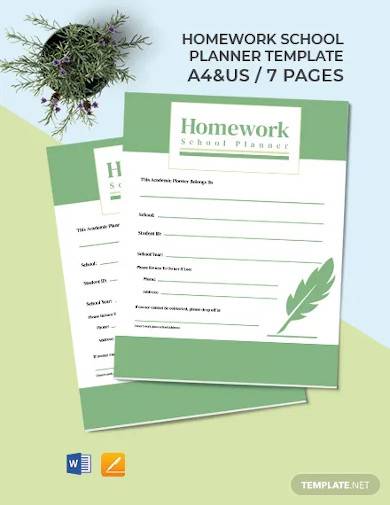
Size: A4 & US

Size: 215 KB
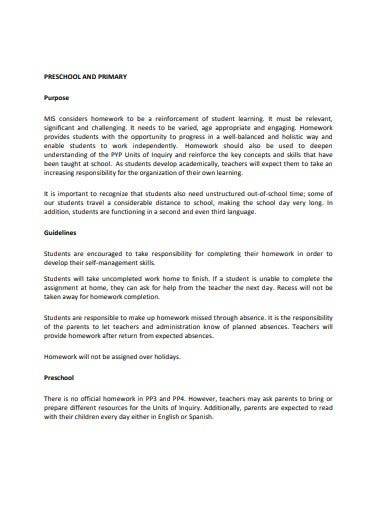
Size: 163 KB
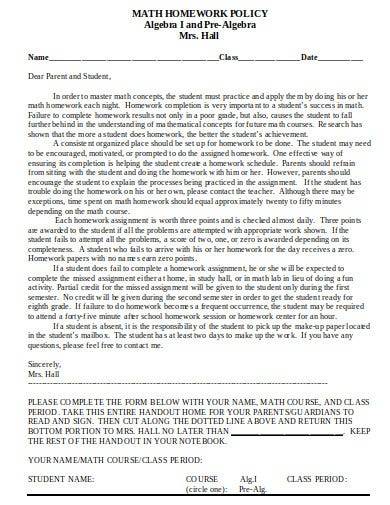
Size: 511 KB
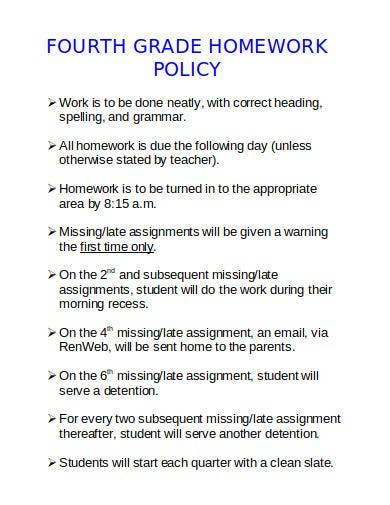
Size: 94 KB
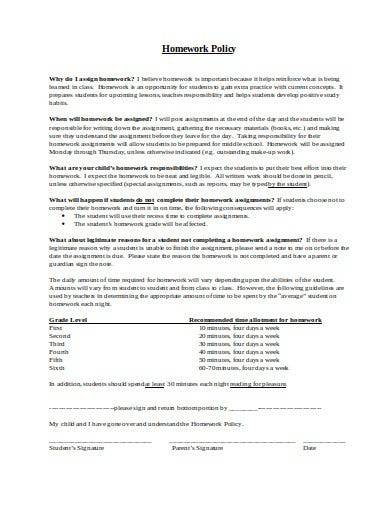
Size: 11 KB
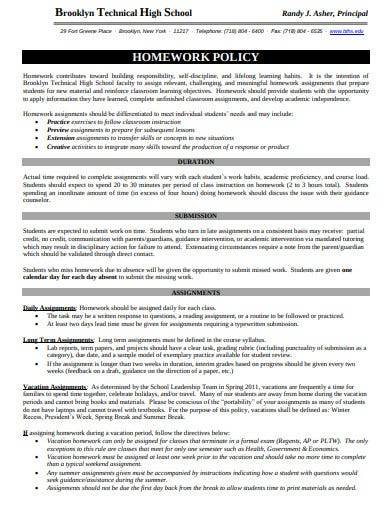
Size: 166 KB
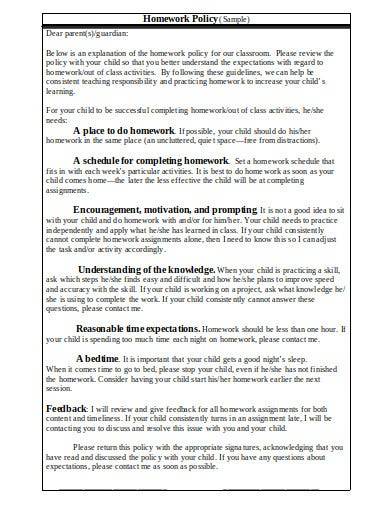
A homework policy is a set of rules provided by the school that contains guidelines on how often instructors or teachers should assign homework or what types of assignments they will be giving to their students. This policy aims to prevent students from overworking while also making sure that they benefit from the homework they are working with. It is part of a classroom management plan that ensures students can have enough time to rest from performing their tasks according to their study plans .
The school policy for distributing homework provides an outline of the methods to be used by teachers and followed by students when accomplishing their assignments. A homework policy is a document that provides and enables the communication between the school and the parents, teachers, students, and government about the learning goals and objectives of the homework with the use of a learning activity planning sheet . One of these goals is to encourage students to immerse themselves in their learning tasks or studies.
A school survey is an initial step in creating homework policies. In this process, you will be able to determine relevant information about the duties that students perform when accomplishing their homework assignments. The student survey template you will use must contain appropriate questions such as how assignments affect them mentally and the reason why they must be included in the teacher lesson plans.
Before implementing changes in the homework policy, make sure that you communicated and consulted your faculty staff. Inform your teachers of the specific rules and regulations you want to impose when assigning homework to the students. You can also ask for their opinions and suggestions about your proposed policy and procedure.
After making adjustments and finalizing, write down the homework guidelines or regulations in a document or memo template. Make sure that you provide enough detailed information on each of them as well as justify their use for the student’s learning.
To enforce the finalized homework policy as an official school policy, incorporate it into your school’s teacher and student handbook. This will inform both teachers and students of the new policy which will eventually become a norm in your institution.
Some of the basic rules for giving students homework include setting activities or assignments they can complete on their own, relevant to the grade level or subject matter curriculum, connected to the class instruction, engaging and purposeful, and quality over quantity must be considered.
Homework can contain simple reinforcement tasks with classroom activities, collecting of additional learning materials or information, reading high-frequency works, and spelling high-frequency words.
The different types of homework provide students with practice exercises such as accomplishing consolidation exercises for math, practicing spelling words, reading for pleasure, essay writing, practicing musical instruments, practicing skills in physical education, and preparing for projects or assignments.
Homework is a strategy or tool used by instructors and teachers to give students the opportunity to practice and hone their skills and understanding of a certain subject matter presented to them. A homework policy is a list of guidelines that teachers must follow when setting or giving homework to their students. It prevents the students from overworking and ensures that they can obtain valuable lessons from this learning activity and experience.
Related Posts
Free 20+ policies and procedures samples in ms word | google docs | pdf, free 50+ feedback policy samples in pdf | ms word, free 10+ high school credit policy samples & templates in ms word | pdf, free 10+ concurrent class policy samples & templates in ms word | pdf, free 10+ student freedom of expression policy samples in pdf, free 10+ suicide prevention policy samples in ms word | pdf, free 10+ plagiarism/cheating policy samples in ms word | pdf, free 50+ policy approval samples in pdf | ms word, free 10+ related personnel policy samples in ms word | pdf, free 10+ suspension and expulsion policy samples in ms word | pdf, free 10+ uniform complaint policy and procedure samples in pdf, free 10+ bullying policy samples in ms word | pdf, free 10+ fiscal control policy samples & templates in ms word | pdf, free 10+ cooperative policy samples & templates in ms word | pdf, free 10+ donation policy samples & templates in ms word | pdf, free 9+ sample weekly timetable templates in pdf ms word, free 12+ assignment schedule samples and templates in pdf ..., free 7+ sample weekly timetable templates in pdf ms word, free 9+ sample preschool calendar templates in google docs ....

How to Write the Perfect Homework Policy
Author: Naimish Gohil
Posted: 10 May 2017
Estimated time to read: 4 mins
Homework is an integral part to the learning process and as such, each school should have a clear homework policy readily available to teachers, students and parents that sets out your expectations when it comes to home-learning .

A clear and effective homework policy will mean that quality and quantity of homework can be easily tracked and all stakeholders are on the same page. We've created our own Homework Policy that you can adapt for use in your school or use as an outline when creating your own policy:
1. Introduction
This is the school’s policy for the provision of homework to pupils and has been drawn up in accordance with guidance from the DFE and Sutton Education Trust. It must be recognised that parents play a vital role in the education of their child, therefore it is important and valuable to have a good home-school partnership, of which a homework policy must address.
2. Homework - A definition
Homework is defined as any work or activity that students are asked to undertake outside of lesson time, either on their own or with the aid of parents and carers. Homework doesn’t necessarily have to be completed at home but can be completed in free periods and after-school homework clubs. We see work completed outside of lesson time as a valuable part of a student’s learning.
3. The purpose of homework
The school regards the purpose of homework as being to:
- Provide learners with the opportunity to work on an activity that is relevant to learning outcomes, or that contributes to gaining qualifications/accreditations.
- Develop an effective partnership between the school, parents and carers in pursuing the academic aims of the school and the development of their child.
- Consolidate and reinforce skills and understanding prior to the following lesson, particularly in English and Mathematics.
- Extend learning across the curriculum, for example through additional reading.
- Encourage pupils as they get older to develop the confidence, self-discipline and independence to develop organisational skills.
As a school, we encourage children to pursue out-of-school activities. Homework should be used to effectively reinforce and/or extend what is learned in school. We hope that children will feel a sense of personal satisfaction in a task completed well and that their efforts will be recognised and praised both at home and at school.
Homework tasks should be undertaken to the best of their ability. We hope that parents and carers will be willing and able to give their active support to ensure that work completed at home is done so conscientiously and in the best possible conditions.
4. Current practice
At the beginning of the academic year, each year group will be informed about what is expected of them with regards to homework.
5. Time to be spent completing homework
Based on current good practice, we ask pupils to spend the following amount of time on homework:
Years 7 to 9: 1 - 2 hours per day
Years 10 & 11: 1 - 3 hours per day
Pupils may be expected to undertake a variety of homework activities. These activities will differ depending on the teacher and subject. Examples include: Reading tasks, numeracy tests, spelling tests, quizzes, project work, classwork extensions, coursework, essays and research activities. As a general rule, teachers will not usually set substantial homework tasks to be completed for the next day, pupils will have at least two days to complete any work set.
6. Pupil feedback
The school recognises the importance of providing prompt and actionable feedback to pupils, parents and carers. Feedback will include how well homework tasks have been tackled, and the knowledge, skills and understanding developed.
A variety of methods will be used to provide feedback, such as an appropriate comment of praise, appreciation or area for improvement. Any given feedback will vary according to the age of the pupil.
7. Where to access the school homework policy
The school will use newsletters to inform parents and carers about the school’s homework policy and secure their involvement. The homework policy, as well as useful information for parents in supporting their child’s learning, is displayed on the school website.
Parents’ Evenings and New Intake Evenings will be used to promote this partnership and obtain feedback (e.g. English and Mathematics workshops). Homework questionnaires will be used where appropriate to ascertain parent views. Parents will be consulted about any significant changes to the policy that are being considered by the governing body.
8. Reviewing the policy
The homework policy will be reviewed every year. Where significant changes to the policy are felt to be required, proposals will be presented to the governing body and parents consulted.

Get a roundup of our articles once per month.
Subscribe to Email Updates
Recent posts, can ai be used for curric..., let's talk about homework..., should we be worried abou..., using character education..., popular posts, how has technology changed education for schools, what is behaviourism, the impact of effective classroom management, the difference between formative and summative assessments.
- Homework (22)
- Teacher Wellbeing (21)
- Student Wellbeing (20)
- Distance Learning (15)
- Classroom Management (14)
- Mental Health (13)
- Ofsted (12)
- Wellbeing (12)
- Skills (11)
- Teacher Workload (11)
- Parental Engagement (10)
- Satchel One MIS (10)
- Staff Wellbeing (10)
- Teachers (10)
- School Culture (9)
- Behaviour Management (8)
- School Improvement (8)
- School Management (8)
- Teacher Resources (8)
- Back to School (7)
- Parental Involvement (7)
- Parents (7)
- Pedagogy (7)
- Student & Parent Resources (7)
- Students (7)
- Assessment (6)
- Cloud-based MIS (6)
- Covid-19 (6)
- Guest Blog (6)
- Leadership (6)
- Online Safety (6)
- Technology (6)
- Bullying (5)
- Digital Literacy (5)
- Marking (5)
- Ofsted framework (5)
- School Closures (5)
- Lesson Plans (4)
- Network Managers (4)
- Revision (4)
- Teacher (4)
- Teaching (4)
- Attendance (3)
- Autonomy (3)
- Data Management (3)
- Education Reform (3)
- Education Technology (3)
- Feedback (3)
- Gender Equality (3)
- Network Manager Resources (3)
- SLT Resources (3)
- School Technology (3)
- Student Engagement (3)
- Students & Parents (3)
- Summer Holidays (3)
- Articles (2)
- Attainment 8 and Progress 8 (2)
- Autonomous Learning (2)
- Children (2)
- Classroom (2)
- Classroom Techniques (2)
- Communication (2)
- Differentiated Homework (2)
- Education (2)
- Education Technolgy (2)
- Embracing Technology (2)
- Exam Results (2)
- Grading (2)
- Home-school Communication (2)
- Homework Debate (2)
- Homework Policy (2)
- Raising Standards (2)
- Reading (2)
- Reducing Workload (2)
- Saving Time (2)
- School Marketing (2)
- School Reopenings (2)
- Security (2)
- Sidekick (2)
- Software Training (2)
- Strategy (2)
- Teaching Crisis (2)
- Teaching and Learning (2)
- Time Management (2)
- Time-saving (2)
- Tips & Tricks (2)
- Workload (2)
- Abuse in the Classroom (1)
- Anti-bullying (1)
- Appreciation (1)
- Attainment 8 (1)
- Benefits of Homework (1)
- Body Image (1)
- British Values (1)
- Career Advice (1)
- Character Education (1)
- Collaboration (1)
- Collaborative Learning (1)
- Continuing Professional Development (1)
- Conversation (1)
- Cost of living (1)
- Cyber-bullying (1)
- Cyberbullying (1)
- Damian Hinds (1)
- Digital Classroom (1)
- Dyslexia Awareness (1)
- E Learning (1)
- Eating Disorders (1)
- Education Secretary (1)
- Empathy (1)
- Exam-ready (1)
- Flipped Classroom (1)
- Formative Assessment (1)
- Girls in STEM (1)
- Global Education (1)
- Global Learning (1)
- Government (1)
- Healthy Eating (1)
- Homework Excuses (1)
- Inspire (1)
- International Learning (1)
- Internet Access (1)
- Interventions (1)
- Job Satisfaction (1)
- Language (1)
- Lead by Example (1)
- Learning Environment (1)
- Manager (1)
- National Curriculum (1)
- Outstanding (1)
- Parent Tips for Homework (1)
- Parent-teacher Relationships (1)
- Parents Evening (1)
- Phased Reopenings (1)
- Physical Health (1)
- Planning (1)
- Preparation (1)
- Productivity (1)
- Progress 8 (1)
- Quality Assurance (1)
- Recognition (1)
- Safeguarding (1)
- School Improvements (1)
- Schools (1)
- Secondary School (1)
- Senior Leaders (1)
- Sharing (1)
- Sharing Best Practice (1)
- Show My Homework (1)
- Slow Processing (1)
- Social Media (1)
- Soft Skills (1)
- Software (1)
- Student (1)
- Student Independence (1)
- Summative Assessment (1)
- Super Union (1)
- Support (1)
- Teaching Schools (1)
- Technology in the classroom (1)
- Tracking & Monitoring (1)
- Training (1)
- Truancy (1)
- Year 6 SATs (1)
- example (1)
- first day of school (1)
- gained time (1)
- homework benefits (1)
- influence (1)
- ofsted inspections (1)
- practice (1)
- quiz creation (1)
- raising awareness (1)
- satchel (1)
- school involvement (1)
- well-balanced education (1)
FREE quiz tool
Browse through over 500k questions created by teachers on Neeto , create a quiz and share back to Satchel One. It's free!
- Satchel One learning platform
- About Satchel
- Get in touch
- Back to all blog posts

IMAGES
VIDEO
COMMENTS
Step 4: Add the Homework Policy to the Student and Teacher Handbook. To make the homework policy an official school policy, integrate it into the teacher and student handbook. In doing so, both faculty and students will be more aware of it. That way, the homework policy will slowly but surely become a norm in your school.
Sample School Homework Policy . Homework is defined as the time students spend outside the classroom in assigned learning activities. Anywhere Schools believes the purpose of homework should be to practice, reinforce, or apply acquired skills and knowledge. We also believe as research supports that moderate assignments completed and done well ...
Policies; Homework policy: examples See examples of homework policies from primary, secondary and special schools to help you write your own. Also, adapt our sample clause for handling the impact of AI tools on homework.
Template Homework Policy 1. Introduction 1.1 Homework is an integral part of education in that it:- Promotes students' self-discipline and personal responsibility for learning and organisation. Reinforces work started in class, extending knowledge and understanding. Gives opportunities to practise and develop skills.
A homework policy is a document that provides and enables the communication between the school and the parents, teachers, students, and government about the learning goals and objectives of the homework with the use of a learning activity planning sheet. One of these goals is to encourage students to immerse themselves in their learning tasks ...
HOMEWORK POLICY PURPOSE The purpose of this policy is to outline to students, parents/carers and school staff, Sandringham Primary School's expectations for homework and at-home learning. ... Sample School Policies Author: seaHall Created Date: 2/24/2021 11:34:40 AM ...
• Let teachers know if homework assignments are too difficult or unclear. Please feel free to write the teacher a note. • Monitor assignment completion through the use of student planners or other established classroom procedures. (References: MCPS Homework Policy [IKB] and Regulation [IKB-RA]; Getting the Most out of Homework, North West
Build Flexibility Into Your Homework Policy EducationWorld is pleased to present this professional development resource shared by Dr. Jane Bluestein, an expert in relationship-building, positive school climate and effective instruction.. Any teacher who has ever given out homework has certainly encountered a student the next day saying, "I don't have my assignment."
Homework Policy v1.1, 2017 3 Appendix 1: Parental Expectations and Guidance • Provide a quiet, calm space for children to work in with the relevant resources. • Hear your child read aloud, ideally daily. Evidence clearly shows that the enjoyment of reading has
7. Where to access the school homework policy. The school will use newsletters to inform parents and carers about the school's homework policy and secure their involvement. The homework policy, as well as useful information for parents in supporting their child's learning, is displayed on the school website.